 Text to Speech
VS
Text to Speech
VS
 Open-Audio TTS
Open-Audio TTS
Text to Speech
Text to Speech is an advanced online tool that utilizes artificial intelligence to convert written text into natural-sounding speech. This technology, also known as speech synthesis, supports a wide variety of languages and voice styles, allowing users to find the perfect voice for their needs.
The tool is designed for ease of use, providing high-quality audio output and a user friendly interface. The generated audio files maintain high accuracy, ensuring the spoken words closely match the original written content. Users can easily download the converted speech in MP3 format for convenient offline access.
Open-Audio TTS
Open-Audio TTS provides a straightforward interface for generating speech from text using the powerful OpenAI Text-to-Speech (TTS) engine. Users can input their text, up to a limit of 4096 characters, and leverage OpenAI's technology for conversion into audible speech.
The tool offers customization options, allowing users to select from different voice profiles including Alloy, Echo, Fable, Onyx, Nova, and Shimmer. Additionally, users can adjust the speech speed and select the desired audio quality. Operation requires an OpenAI API key, indicating reliance on OpenAI's backend infrastructure. A link to its GitHub repository is provided for those interested in the underlying code or further development.
Pricing
Text to Speech Pricing
Text to Speech offers Freemium pricing with plans starting from $5 per month .
Open-Audio TTS Pricing
Open-Audio TTS offers Usage Based pricing .
Features
Text to Speech
- Enhanced Accessibility: Supports individuals with visual impairments or reading disabilities.
- Cost-Effective Content Creation: Eliminates the need for hiring voice actors.
- Wide Range of Voices: Offers a variety of natural-sounding voices in multiple languages.
- Convenient Download: Allows users to download generated speech files for offline use.
- High Accuracy: Ensures precise audio output that closely matches the original text.
- Cross-Device Use: Compatible across iPhones, laptops, and desktop computers.
Open-Audio TTS
- OpenAI TTS Integration: Leverages OpenAI's advanced text-to-speech engine for audio generation.
- Multiple Voice Options: Offers a selection of voices including Alloy, Echo, Fable, Onyx, Nova, and Shimmer.
- Speed Control: Allows users to adjust the playback speed of the generated speech.
- Quality Selection: Provides an option to choose high audio quality.
- Text Input Limit: Accepts input text up to 4096 characters.
Use Cases
Text to Speech Use Cases
- Creating voiceovers for videos and ads
- Generating audiobooks
- Developing accessible educational content
- Supporting individuals with visual impairments
- Enhancing content for users with reading disabilities
Open-Audio TTS Use Cases
- Generating voiceovers for videos or presentations.
- Creating audio versions of articles or blog posts.
- Developing accessibility features requiring text-to-speech functionality.
- Prototyping voice user interfaces or applications.
- Producing audio content for podcasts or e-learning materials.
Uptime Monitor
Uptime Monitor
Average Uptime
98.41%
Average Response Time
247.03 ms
Last 30 Days
Uptime Monitor
Average Uptime
98.37%
Average Response Time
190.07 ms
Last 30 Days
Text to Speech
Open-Audio TTS
More Comparisons:
-
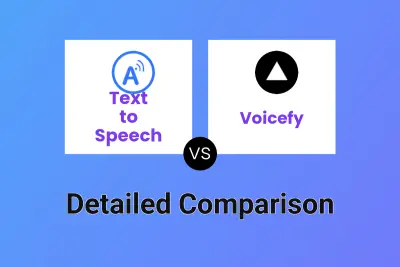
Text to Speech vs Voicefy Detailed comparison features, price
ComparisonView details → -

Text to Speech vs Text2Audio Detailed comparison features, price
ComparisonView details → -
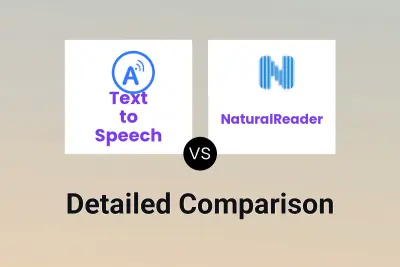
Text to Speech vs NaturalReader Detailed comparison features, price
ComparisonView details → -
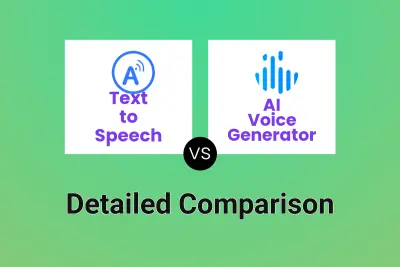
Text to Speech vs AI Voice Generator Detailed comparison features, price
ComparisonView details → -

Text to Speech vs Kokoro TTS Detailed comparison features, price
ComparisonView details → -
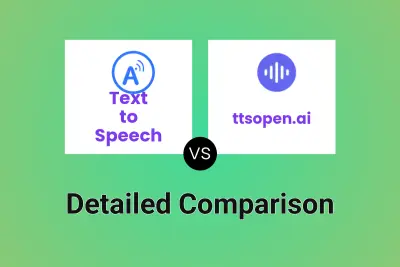
Text to Speech vs ttsopen.ai Detailed comparison features, price
ComparisonView details → -
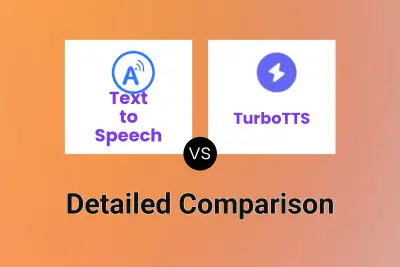
Text to Speech vs TurboTTS Detailed comparison features, price
ComparisonView details → -
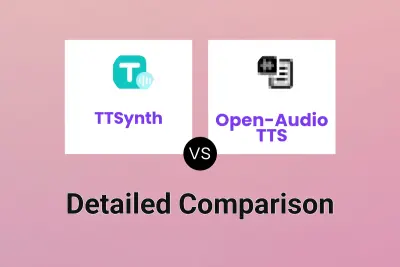
TTSynth vs Open-Audio TTS Detailed comparison features, price
ComparisonView details →
Didn't find tool you were looking for?